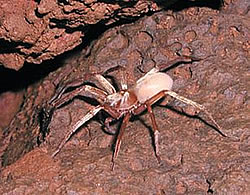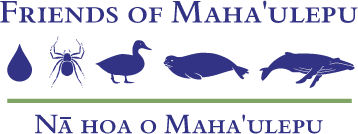
Endangered Kaua’i Cave Wolf Spider. Known only to occur at caves with an area of 10.5 square kilometres at Maha’ulepu.
Hawaii Dairy Farms (HDF), a large Dairy proposed for the South Shore of Kaua’i, would be owned and operated by the “for profit” side of Ulu’pono Initiative, a venture capital investment firm of billionaire, Pierre Omidyar.
Key Facts about HDF’s proposed industrial dairy for Maha’ulepu Valley, Kaua’i:
- HDF leased 578 acres from Grove Farm less than a mile upslope from Maha’ulepu Beach, 1.7 miles east of the Grand Hyatt Resort. HDF plans to start operation with 699 pregnant cows and increase to a 2,000-cow dairy.
- HDF’s Dairy Plan must be approved by DOH for operation. Hawaii Guidelines for Livestock Waste (Nutrient) Management: http://health.hawaii.gov/wastewater/files/2013/06/livestock.pdf
- HDF’s most recent application to operate was filed with the State Department of Health (DOH) on July 23, 2014. The State completed its review but did not approve that Plan and the DOH Waste Water Chief declined further work on that plan (Sina Pruder letter 9/15/14).
- On 11/26/14, HDF announced it would complete an EIS with no construction, other than grubbing & grading (pasture prep, test well installation & fencing), to occur until the EIS is complete. Friends of Maha’ulepu (FOM) filed a Clean Water Act Complaint in Federal Court for ongoing unpermitted pollution discharge to the streams and ocean below, 6/1/15.
- HDF recently released its Draft EIS, filed 6/8/16 with DOH. Just one week prior, and without any notice to the public, HDF amended their 7/23/14 Waste Management Plan. They claimed their 2014 Plan was safe and their EIS would prove it. Apparently they weren’t able to do so.
- Thus far, HDF’s proposed plans do not include any disaster protocols. There is no plan for evacuation of their cows and no remedy offered for the thousands of gallons of storm water that would be added to their effluent ponds during a hurricane or serious tropical storm. This is a very serious omission considering that their effluent ponds would, per their own plan, have to be pumped out because of the hundreds of thousands of gallons of waste water the storm would otherwise add. Per their Plan, it will take 96 hours to pump out the largest of the effluent ponds to avoid rupture or major breach of effluent. Even our normal tropical storms could result in disaster, as manure would be washed into the many ditches on the farm site. In addition, there is no shelter for the cows who are to be left in the open except when being milked.
- The designated farm manager, Jim Garmatz, testified under oath that there are many ditches on HDF’s site, all of which ultimately drain into the Waiopili Stream which then flows across Maha’ulepu Beach directly to the ocean.
- Water quality testing of the Waiopili Stream over the past two years has already established that the Waiopili is the most chronically and outrageously polluted fresh water stream on Kaua’i. The fecal bacteria (enterococci) counts detected have been more than 200 times the State safe limit. Any added fecal bacteria from cow manure would add to the already impaired waters and thus increase its current public health risk especially where children play in the water that pools on the beach before it enters the ocean.
- Most of Maha’ulepu Valley’s soils are clay based. Most are saturated after 0.02 inches of rain or irrigation. The clay soil is slippery. Cascading water during a tropical storm is extremely powerful. The risk of hundreds of thousands of gallons of manure and even cows floating down the Poipu coastline is all too real.
- The economic disaster in loss of property values and jobs on the South Shore, proven to occur in other communities plagued by nearby noxious odors and biting flies, would permanently change our quality of life and the future for our children.
- The initial herd (699 pregnant cows) is not in Hawaii yet. If HDF’s Dairy is approved, Mr. Garmatz testified that the pregnant cows would be brought to Kauai just 15 days prior to birthing. So the 699 dairy cows would double within 2 weeks of arrival. HDF Plans to keep and raise the heifers, and some bulls while growing their dairy herd to 2,000 cows.
- HDF anticipates each cow will produce 5.3 gallons of milk 2x per day, or 7,000 total gallons daily from the 699 cows. This production, however, relies on a plan to use 2.93 million gallons of water daily from the Waita Reservoir (HDF Plan, pgs. 31, 37, 44). Per HDF, they will contract to sell their milk to Meadow Gold. All milk is to be shipped off island, processed, bottled and distributed by Meadow Gold to its vendors, in State and abroad. Meadow Gold has requested HDF follow International Milking Standards.
- Each cow is expected to drop at least 100 lbs of wet manure per day. 699 cows will deposit nearly 2 million lbs of wet manure monthly. Per HDF, their most recent amendment admits that there will be waste runoff. The remainder of all waste dropped will be left where it falls. Their draft EIS documents that there will be unintended discharge from the dairy. They offer no explanation as to how the tonnage of anticipated discharge was determined. There are no plans for methane digesters or use of the waste off site. In six months, 12 million lbs of manure will be produced with no plans for its removal.
- When HDF’s herd is 2,000 cows, the monthly waste to remain on the dairy site will be 6.3 million lbs of manure. In six months, the Phase II herd will leave behind 37.8 million pounds of wet manure in Maha’ulepu Valley, a historic & culturally rich, island gem. Maha’ulepu is a sustenance fishing ground and area of ancient Hawaiian cultural practices. This volume of waste is certain to emit noxious odors and provides an ideal medium to breed millions of biting flies. That amount of waste in Maha’ulepu is particularly dangerous because of the poor absorption of it’s predominantly clay soil. The runoff, certain to occur, will further compromise the fresh water streams that flow from the site to the ocean. The drinking water for all of Poipu and most of Koloa comes from three County Wells within 750 feet of the pastures where daily manure dropped from cows and manure solids from effluent ponds are to be dumped. HDF’s pastures are directly over the ground water that recharges our three County Wells. Maha’ulepu Beach with its fragile coral reefs are less than a mile down-slope (68 foot elevation to sea level) from the massive wet manure that will be produced daily.
- Located on the South Shore of Kaua’i, HDF plans to divide the farm into 118 fenced parcels (approx 3-4 acres). They plan to rotate the herd using 6 of the 118 parcels daily. HDF plans to graze “mobs” of 115 each (initial herd) on 1 of six 3-4 acre parcels per day. Once the herd expands to 2,000, HDF plans to graze “mobs” of 333 mature dairy cows (1200 lbs) on 1 of 6 parcels daily. HDF will supplement the herd’s diet with at least 30% imported grain.
- The HDF grazing plan for the initial herd will result in a grazing density of 29.1 cows per acre (699 cows on 24 acres = 29.1 cows/acre, far in excess of the industry standard of not more than one cow per acre in climates that have year round favorable growing conditions). If their herd expands to 2,000 dairy cows in production as they plan, the grazing density will be 80 cows per acre. HDF has no plan to increase the farm acreage between Phases I and II.
- Although HDF claims Maha’ulepu is well suited for the planned dairy, HDF’s assertion is specifically contradicted by the findings of the NRCS (a federal agency, the Natural Resource Conservation Service), a division of the US Department of Agriculture. The NRCS conducted a “Custom Soil Resource Report” for the dairy site and concluded that most of the soil on the Maha’ulepu farm is “very limited” in its ability to absorb animal waste. The Report further described the majority of the soil at “high” or “very high” risk for run off due to the clay component of more than 60 % of the farm soil (NRCS Report pgs 38-50, June 5, 2014).
- HDF never disclosed the NRCS study or its adverse findings to DOH. Instead, HDF claimed that the farm’s soils were well suited for an animal feed operation with a plan to leave all cow manure where it falls on the pastures.
- HDF’s owners are not experienced farmers and have never designed or operated a dairy farm.
